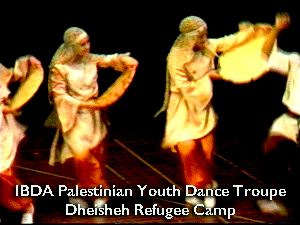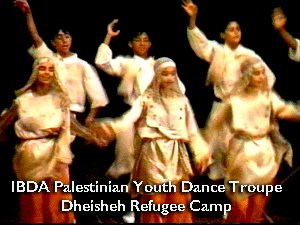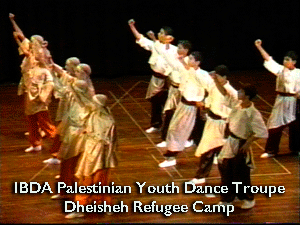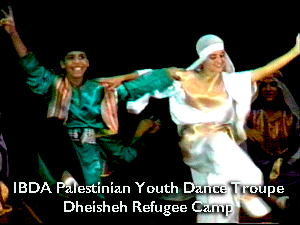Palestinian Dance Troupe
"Ibda means 'making something out of nothing,'" said Barbara Lubin, a Middle East Children's Alliance board member. "And clearly living in Dheisheh refugee camp is not nothing. It's a very tight-knit, strong community. In some ways there is more community in those camps than we have here in the United States."
 The dances were bittersweet. Colorfully dressed peasants celebrated and worked the fields with cardboard picks and scythes. Inevitably, black ghosts came to spirit the peasants away or shackle their hands. Each dance ended with the hope that national pride would galvanize the Palestinians against the black ghosts, which organizers said were symbols of Israeli occupation.
The dances were bittersweet. Colorfully dressed peasants celebrated and worked the fields with cardboard picks and scythes. Inevitably, black ghosts came to spirit the peasants away or shackle their hands. Each dance ended with the hope that national pride would galvanize the Palestinians against the black ghosts, which organizers said were symbols of Israeli occupation.
In dances and autobiographical poems, the 11- to 14-year-olds expressed sorrow, anger and optimism. Jews are not their enemies, they said, but they voiced anger with the settlers.
"My color -- white, black, yellow," a young man read. "People have all different colors of skin, but red is the color of blood, which flows through the heart of all people, no matter where they come from."
"My hopes are simple," said another speaker. "To live without checkpoints and soldiers, to have a room to myself, to play in a playground, to have water every day, so that I can take a bath and go swimming."
Dheisheh Dancers





 The dances were bittersweet. Colorfully dressed peasants celebrated and worked the fields with cardboard picks and scythes. Inevitably, black ghosts came to spirit the peasants away or shackle their hands. Each dance ended with the hope that national pride would galvanize the Palestinians against the black ghosts, which organizers said were symbols of Israeli occupation.
The dances were bittersweet. Colorfully dressed peasants celebrated and worked the fields with cardboard picks and scythes. Inevitably, black ghosts came to spirit the peasants away or shackle their hands. Each dance ended with the hope that national pride would galvanize the Palestinians against the black ghosts, which organizers said were symbols of Israeli occupation.